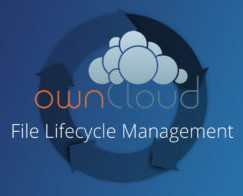ownCloud App for Managing Entire Lifecycle of Files
Allows archiving and deletion rules for each file to be aligned with internal policy requirements and regulatory needs, simplifying administration and control.
This is a Press Release edited by StorageNewsletter.com on December 27, 2019 at 2:20 pmWith the File Lifecycle Management (FLM) App, ownCloud GmbH offers users of the Enterprise version an option to manage and control the entire lifecycle of files.

The function allows archiving and deletion rules for each file to be fully aligned with internal policy requirements and regulatory needs, simplifying administration and control. Older or no longer needed files, for example, are automatically stored in a specific location. The final deletion of certain files can also be automatically controlled via a so-called ‘file retention’ policy. This is important, for example, when managing files that contain personal data and may only be stored in the company for a certain period of time within the framework of the GDPR regulations. Thus the company helps to ensure compliance with data protection rules and offers valuable protection vs. severe penalties for GDPR violations.
Archive functions for users
Once archived, files can be recovered with FLM either by the user or by a privileged group of users. This prevents accidental deletion of files by individual users. Other users can track when a file was edited or moved.
Users can view the lifecycle set for a file and see when the file is scheduled for archiving. In addition, the archive can be searched and information on archived files such as their previous storage location can be retrieved. All lifecycle events of a file are displayed transparently and can also be sent to the user by e-mail if desired.
The upload date of each file is saved as the basis for the archive function.
File retention
Especially helpful is the function ‘File Retent,’ which is provided by the interaction of the ‘Workflow App’ and the ‘FLM App’, especially in times of the GDPR. Administrators can keep their ownCloud ‘clean’, as files are automatically deleted after an individually adjustable period of time. This function can be applied to individual files, but also to entire file groups that have certain characteristics. A concrete example of this would be files that contain personal data and must therefore be deleted after a certain period of time. How valuable such a tool can be is shown by the current warning cases in which companies have to pay high fines for violations of the GDPR. The most recent example is the real estate group Deutsche Wohnen SE, which has to pay a two-digit million fine because its archives did not provide any possibility at all to delete tenants’ files once they were no longer needed. Companies can effectively prevent such risks with automated deletion.
Policy configuration for administrators
Administrators can use FLM to make settings about the policies that apply to archiving and deleting data. This allows administrators to specify which data should be archived and when. It is also possible to configure the period of time after which archived files are to be deleted automatically. Administrators have two options for enforcing policies: Hard policies do not allow users to interfere with the default lifecycle of data. If, on the other hand, so-called soft policies are used, users can, for example, restore archived data independently.
Further functions
In addition, functions such as upload time tracking and the recording of audit events extend the range of actions for administrators. With upload time tracking, administrators can record the exact time at which each file was first created on the ownCloud server. In addition, FLM records audit events during archiving, recovery or deletion of data. With the FLM App in combination with the ‘Workflow App’, the company offers a solution for managing and controlling the complete lifecycle of files.














 Subscribe to our free daily newsletter
Subscribe to our free daily newsletter

